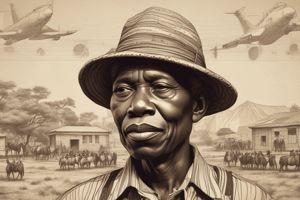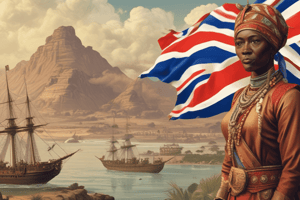Podcast
Questions and Answers
What impact did colonial powers have on African nations?
What impact did colonial powers have on African nations?
- They promoted ethnic unity in the regions.
- They ensured equal distribution of resources.
- They imposed arbitrary borders that disregarded existing groups. (correct)
- They established democratic governance in all territories.
Which of the following statements accurately describes a key challenge in African politics?
Which of the following statements accurately describes a key challenge in African politics?
- Corruption significantly undermines public trust and development. (correct)
- Economic equality is universally achieved across African nations.
- Ethnic conflicts are entirely resolved in most regions.
- All African nations operate successfully under one-party rule.
Which political structure is NOT commonly found in African countries?
Which political structure is NOT commonly found in African countries?
- One-party rule
- Absolute monarchy (correct)
- Multi-party systems
- Strong presidentialism
What critical role does the African Union (AU) serve in the continent?
What critical role does the African Union (AU) serve in the continent?
Which of the following leaders is most recognized for their role in dismantling apartheid?
Which of the following leaders is most recognized for their role in dismantling apartheid?
What often contributes to political unrest in African nations?
What often contributes to political unrest in African nations?
Which factor significantly influenced the political structures in African countries after independence?
Which factor significantly influenced the political structures in African countries after independence?
What is a significant consequence of weak governance in many African nations?
What is a significant consequence of weak governance in many African nations?
What is a major challenge faced by resource-rich African nations?
What is a major challenge faced by resource-rich African nations?
How do economic development and political stability interact in African nations?
How do economic development and political stability interact in African nations?
What do varying capacities of governance structures across Africa indicate?
What do varying capacities of governance structures across Africa indicate?
Which of the following influences the political landscapes of African nations?
Which of the following influences the political landscapes of African nations?
What role does foreign aid play in the governance of African nations?
What role does foreign aid play in the governance of African nations?
What is a significant opportunity for African nations in addressing their challenges?
What is a significant opportunity for African nations in addressing their challenges?
What is a common issue with the judicial systems in African countries?
What is a common issue with the judicial systems in African countries?
Which of the following is a challenge faced by African nations in their governance systems?
Which of the following is a challenge faced by African nations in their governance systems?
Flashcards
Colonial Borders
Colonial Borders
The drawing of borders during colonization often ignored existing ethnic and linguistic groups, leading to significant divisions within African nations.
Corruption in Africa
Corruption in Africa
Many African countries struggle with corruption, which can undermine public trust and hinder development.
Ethnic and Religious Conflicts
Ethnic and Religious Conflicts
Different groups in Africa often have conflicts based on ethnicity or religion, leading to violence and instability.
Economic Inequality
Economic Inequality
Signup and view all the flashcards
Natural Resource Conflicts
Natural Resource Conflicts
Signup and view all the flashcards
Regional Political Organizations
Regional Political Organizations
Signup and view all the flashcards
Influential African Leaders
Influential African Leaders
Signup and view all the flashcards
Types of African Political Systems
Types of African Political Systems
Signup and view all the flashcards
Governance in Africa
Governance in Africa
Signup and view all the flashcards
Political Systems in Africa
Political Systems in Africa
Signup and view all the flashcards
Resource-rich African nations
Resource-rich African nations
Signup and view all the flashcards
Economic development and politics in Africa
Economic development and politics in Africa
Signup and view all the flashcards
External influences on African politics
External influences on African politics
Signup and view all the flashcards
Challenges and opportunities in Africa
Challenges and opportunities in Africa
Signup and view all the flashcards
Ethnic and religious conflicts in Africa
Ethnic and religious conflicts in Africa
Signup and view all the flashcards
Strengthening democratic institutions
Strengthening democratic institutions
Signup and view all the flashcards
Study Notes
Historical Context
- African politics is shaped by a complex interplay of historical factors, including colonialism, the legacy of tribal structures, and post-independence challenges.
- Colonial powers imposed arbitrary borders, often disregarding existing ethnic and linguistic groups, creating lasting divisions.
- The uneven distribution of resources and power also frequently emerged from colonial rule, resulting in persistent inequalities.
- Post-independence struggles involved negotiating newly formed nation-states, fostering national unity, dealing with ethnic tensions, and establishing governance structures.
Types of Political Systems
- African political systems are diverse, encompassing various forms of democracy, authoritarianism, and hybrid models.
- Some countries maintain multi-party systems, while others experience one-party rule or strong presidentialism.
- The specific political structure in each country is often influenced by historical events and cultural factors.
Key Political Issues
- Corruption is a significant challenge in many African nations, impacting public trust and hindering development.
- Weak governance and lack of accountability often contribute to corruption and inequality.
- Ethnic and religious conflicts have led to violence and instability in numerous regions, affecting political stability and economic development.
- Economic inequality often fuels political unrest.
- The political landscape is further complicated through natural resources, causing disputes or creating dependencies for surrounding nations and political factions.
Political Leaders and Figures
- Throughout the continent's history, numerous leaders and figures have shaped the political landscape.
- Some, such as Kwame Nkrumah of Ghana, played crucial roles in the struggle for independence.
- Others, like Nelson Mandela of South Africa, became recognized internationally for their involvement in the dismantling of apartheid.
- The political leadership of the continent evolves, and the impact and influence varies by political figure.
Regional Political Organizations
- Regional organizations like the African Union (AU) and Economic Community of West African States (ECOWAS) aim to promote cooperation, address shared challenges, and contribute to regional integration.
- These organizations play a crucial role in fostering dialogue and peaceful resolutions to conflicts within the continent.
- The effectiveness of these organizations, however, varies depending on the specific context and regional dynamics.
Governance and Institutions
- The functioning of governance structures demonstrates variations throughout the continent, exhibiting differing degrees of capacity and effectiveness, from institution efficiency to public service delivery.
- Bureaucratic systems and institutions demonstrate unique vulnerabilities, and some struggle to provide services to the population.
- Political systems encounter issues with the impartial enforcement of laws and policies.
- The efficiency and effectiveness of judicial systems vary across countries, and challenges remain in ensuring fair and equitable application of legal frameworks.
Economic and Political Interrelationships
- The economic fortunes of African nations often have political implications.
- Resource-rich nations face challenges in managing wealth and minimizing the potential for conflict.
- Economic development greatly impacts political stability and the overall effectiveness of governance systems.
- Dependence on resource extraction can often result in political instability, inequality, and hinder diversification.
External Influences
- The political landscapes are shaped by interactions and relations with external factors, including global economic trends, international organizations, and powerful nations.
- Global power dynamics and financial institutions frequently have impacts on the political direction of different countries.
- Foreign aid and investments may be influenced by political factors and diplomatic pressures.
- Regional politics are interwoven with international affairs.
Challenges and Opportunities
- African nations face a multitude of problems like maintaining political stability, combating corruption, and promoting sustainable development.
- The development and strengthening of democratic institutions are often pursued as a means for mitigating some of these challenges.
- Opportunities exist for strengthening regional cooperation and integration, improving governance practices, and attracting foreign investment that supports sustainable development.
- Addressing ethnic and religious conflicts through peaceful means and diplomatic dialogue, while promoting reconciliation, presents ongoing challenges and possibilities for improvement.
Studying That Suits You
Use AI to generate personalized quizzes and flashcards to suit your learning preferences.




